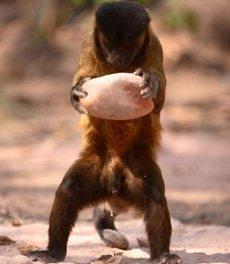
Monkeys are primates just like us; but most would argue that they don't have our intelligence. They are smart, with some species figuring out how to use tools to crack nuts. However, they seem to be missing some of the other key "smarts". Crucially, this includes the ability to understand why a particular solution to a problem works. Why does hitting a nut with a rock yield food?
Take the Capuchin monkeys for example. They're one of the nut cracking species. And they can solve a pretty challenging puzzle. A treat is placed in a tube with a hole between the tube and the monkey. Try and pull the treat out and it'll fall into the hole. However, push it out and you bypass the hole entirely. Yet when the hole is removed those monkeys continue to push it out; adding an extra, unnecessary step to the procedure.
Clearly they don't really understand what's going on. Humans would never make such a silly mistake.
Except we do. And we make it so often it's even got it's own name: the Einstellung effect. This refers to our habit of going with a known strategy, even if better strategies exist. And it's not an insignificant stumbling block either. During an experiment humans were taught one way to solve a puzzle. 70-100% continued to use that method even when easier techniques became available. On the other hand, those who were never taught the original method routinely spotted the better one and would rarely (in some cases, never) use the taught solution. It was so overly complicated it just wasn't independently invented.
And things get worse for us "smart" humans. When the puzzles were altered to make the taught method unusable, >50% of people failed to find the simpler technique. They'd become so reliant on their preferred solution that they simply couldn't see past it. Kind of like how Capuchin monkeys continue to use their preferred method to retrieve the treat, even when simpler ones are available.
Monkeys and humans make similar mistakes in other areas as well. For instance, social cues influence our performance on other tests.
For the longest time it was thought monkey don't have a sense of self identity (or theory of mind) because they don't recognise themselves in the mirror. However, researchers realised that many monkeys take eye contact as a sign of aggression so would be unwilling to engage with the monkey in the mirror (and realise it is them). When this was controlled for suddenly evidence that monkeys had theory of mind emerged. Social cues also influence human performance on tests as well. Use more dramatic language to describe a car accident and humans are more likely to remember the windows being broken. Even when they never broke!
But what's perhaps most interesting about all of this is how the two groups are treated differently when such errors are discovered. Humans stick with their taught strategy and it's labelled an "effect", given an odd German name and dismissed as a quirk of our psychology. It doesn't tarnish our super-smart reputation. Yet a monkey makes the same mistake and suddenly they lack the ability to understand why taught methods work. Apply the same logic to humans and we'd be just as dumb.
An amended version of a famous quote seems apt:
Everyone is smart, but judge a monkey by it's ability to push a treat through a tube and it will spend it's whole life thinking it's stupid
Referenecs
de Waal, F. B., Dindo, M., Freeman, C. A., & Hall, M. J. (2005). The monkey in the mirror: hardly a stranger. Proceedings of the National Academy of Sciences of the United States of America, 102(32), 11140-11147.
Luchins, A. S. (1942). Mechanization in problem solving: the effect of Einstellung. Psychological monographs, 54(6), I.
Visalberghi, E., & Limongelli, L. (1994). Lack of comprehension of cause€ ffect relations in tool-using capuchin monkeys (Cebus apella). Journal of Comparative Psychology, 108(1), 15.

